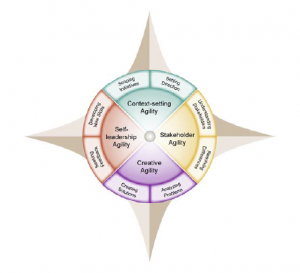By Bill Joiner, President, ChangeWise.

As a manager, no one needs to remind you that we live in a global economy that constantly bombards us
with change and complexity. Every year, new technologies, markets, and competitors emerge at an ever-increasing pace. As change accelerates, so do novelty and uncertainty. Future threats and opportunities
become harder to predict. We also live in an increasingly complex, interconnected world, where quality
attention to internal and external customers, strategic allies, and other stakeholders is essential for
business success.
While specific future developments are increasingly difficult to predict, there are two deep trends we can
predict with great certainty: The pace of change will continue to increase, and the level of complexity and
interdependence will continue to grow. For over a decade, organizational change experts, acutely aware
of these powerful trends, have been talking about the need to develop “agile” companies — organizations
that anticipate and respond rapidly to changing conditions by leveraging highly productive internal and
external relationships.
To enjoy sustained success, companies need to develop a level of organizational agility that matches the
increasing level of change and complexity in their business environment. Yet, for the vast majority of
companies, full-fledged strategic and operational agility is still more an aspiration than a reality. One of
the major reasons for this continuing “agility gap” is the need to develop more agile leaders. To develop
teams and organizations with the level of agility demanded by today’s turbulent business environment,
companies need leaders who embody a corresponding level of agility.
It’s no wonder, then, that senior executives have ranked agility among the most critical leadership
competencies needed in their companies today.1 What is leadership agility? In essence, it’s the ability to lead effectively under conditions of rapid change and mounting complexity. Because these trends affect all managerial levels, this is a competency that’s increasingly needed not just in the executive suite but throughout the organization.
Research reported in Leadership Agility, a book I co-authored, shows that managers grow through multiple stages in the mastery of this vital competency. Each new level of agility represents an ability to respond effectively to an increased level of change and complexity. Strikingly, this research indicates that only about 10% of managers have mastered the level of agility needed for consistently effective leadership in today’s turbulent world economy.